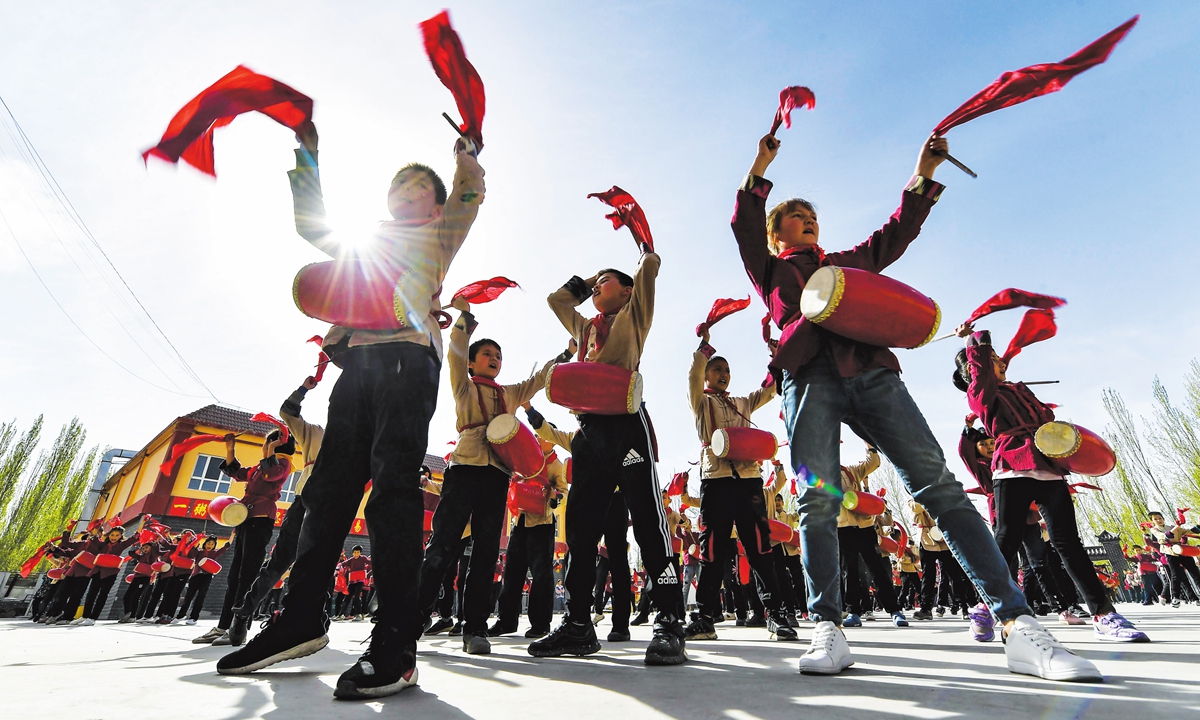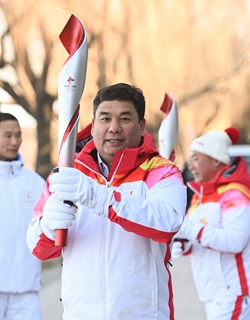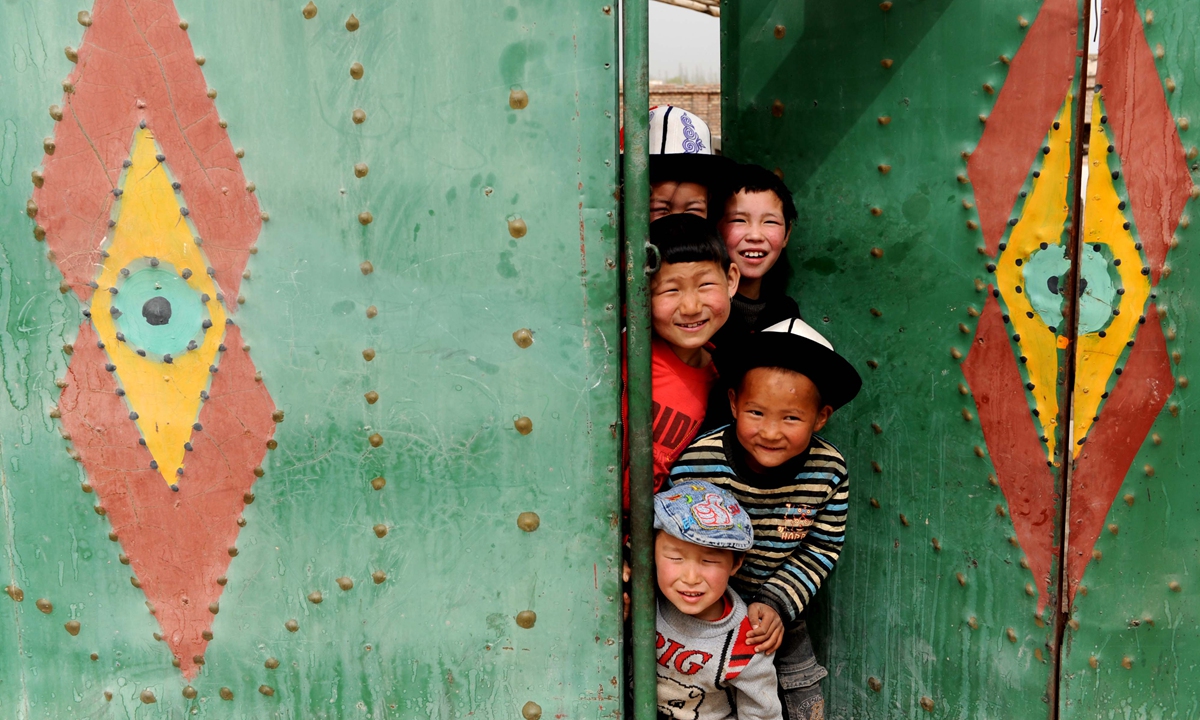Editor's Note:Who is the Communist Party of China (CPC)? What is the CPC's role in the new era?
The CPC has grown into one of the largest parties in the world in the process of leading Chinese people in seeking liberation and happiness, making China as strong and prosperous as it is today.
As the CPC ushers the nation into a new era of development, the last decade has witnessed great achievements in national strength and prosperity, with people's confidence and recognition of this path rising to unprecedentedly high levels.
With more than 96 million members, the CPC will convene its 20th National Congress in the second half of the year, which is expected to guide the country's development and policymaking. Ahead of the meeting, the Global Times is publishing a series of stories to help the world understand the CPC in the new era, through the stories of CPC members working on the frontlines of various fields, as well as through observations made by respected scholars.
This installment tells the story of a grassroot primary school headmaster from the southern part of Xinjiang Uygur Autonomous Region who devotes himself to providing better education and promoting a sense of community for the Chinese nation.

Kurban Niyaz's students perform Ansai waist drum dance, a traditional dance from Northwest China's Shaanxi Province on April 8, 2019. Photo: VCG
Kurban Niyaz has been busy. It is the summer holiday, but this primary school headmaster does not rest.
He flew to Beijing from Xinjiang. There were still some final negotiations and details regarding his second school, which is to be opened this September.
This time, the new school will cover all grades from kindergarten to high school and will introduce the teaching resources from the affiliated schools of Tsinghua University, which is the golden standard for China's top education quality.
Kurban Niyaz's school is located in Kurban's hometown, Aksu prefecture, southern Xinjiang, about 4,000 kilometers from Beijing.
It seems impossible that a remote school in Xinjiang could be affiliated with Tsinghua, but over the last decade, Kurban has proven anything is possible with some effort.
Previously, he has built a school under great difficulties and ran it for 19 years. He has sent his students from villages to colleges around China, including Tsinghua University. He himself even became a torchbearer at the 2022 Olympic Winter Games in Beijing.
Over the years, Kurban has never forgotten his mission of fostering ethnic unity and forging a strong sense of community for the Chinese nation. Through the promotion of traditional Chinese culture, he uses education to build a bridge to modernization.
He always tells his students that just like a drop of water can exist forever by running into the ocean, an ethnic group needs to blend into the larger national family for continuous development.
Life changing deedsKurban's first school is a Standard Spoken and Written Chinese Language Primary School, which is located in Qianjin township, Wushi county, in the Aksu prefecture.
In August 2003, Kurban founded the school with his own savings after seeing the development gap between his hometown and some eastern provinces.
"Language is the key to the wider world ," he believes.
At that time, Wushi was a national-level poverty-stricken county. Rural children there lacked an educational foundation. Local people lived under a heavy religious environment.
"I have been to university, so I want to provide a good educational environment for local children," Kurban said. "I really hope that through education, our children can walk out of their restricted realities into the wider world, changing their lives through knowledge."
Despite doubts, criticisms, and difficulties, he has never stopped running and leading the school over the past 19 years.
Many of his students have had their lives changed through education. The first group of graduates from the school entered universities in Shanghai and Tianjin in 2016. One of them was admitted to Tsinghua University with the highest test scores in Aksu.
On December 18, 2018, at the conference marking the 40th anniversary of China's reform and opening-up, Kurban was awarded a reform pioneer medal together with Alibaba co-founder Jack Ma Yun, Baidu co-founder Li Yanhong, and former basketball star Yao Ming.
"I will not forget my original goal and task to allow more children to enjoy high-quality and fair education," Kurban said.

Kurban Niyaz serves as the torchbearer at the 2022 Olympic Winter Games at the Summer Palace of Beijing 0n February 4, 2022. Photo: Xinhua
In February 2022, Kurban completed a mission to be the torchbearer at the Beijing 2022 Winter Olympic Games in the Summer Palace of Beijing.
Afterward, he returned to Xinjiang and shared his experience and feelings with his students.
"The children were so happy, so proud. They all wanted to get closer and have a touch of the Olympic Games," Kurban told the Global Times. "To all of us, this is an honor."
"Through my experience, the children learned not just about the torch and the 2022 Olympic Winter Games, but also the care from the Party and the entire country. They feel confident and proud of the motherland."
A decade of progressIn 1986, Kurban graduated from Xinjiang University majoring in Chinese language and literature and became a teacher.
In the 1990s, Kurban began traveling to other parts of China. He gradually discovered that in the southeast coastal areas, people's ideas and concepts were far more open, and the economy and culture developed rapidly. He started to ask himself, "What is the reason for such a big gap between my hometown and those developed areas?"
Even in the early 2010s, when Kurban's school had seen succuss in fostering children, Xinjiang was still suffering from the instability brought about by the "three forces" of separatist, terrorist, and extremist.
Even his school was impacted - some extremists tried to deter Kurban from running the school and would damage the property from time to time. For instance, they took away the school's plaque or set fire to the kitchen.
Statistics show that from 1990 to the end of 2016 alone, separatist, terrorist, and extremist forces launched thousands of terrorist attacks in Xinjiang, killing innocent people and police officers, according to the Xinhua News Agency.
Thanks to the law enforcement efforts in recent years, the region has reported no terrorist incidents in more than five years - a remarkable achievement that has, to a great extent, ensured the primary and basic rights to life and development of people of all ethnic groups in the region.
"To be honest, since the 18th National Congress of the Chinese Communist Party (CPC) in 2012, ethnic unity has been highlighted in Xinjiang. Through the Party's wisdom, new thoughts and theories on ethnic unity are now being practiced, cultivated, and grown here," Kurban said.
Therefore, the popularity and promotion of Putonghua and Chinese culture is necessary. "In order to strengthen the unity of the Chinese nation, we need to strengthen communication through using the same language, so that thoughts and hearts could be interconnected."
"Now if you check douyin or other social media platforms, you see an open and modern Xinjiang," Kurban said. "People in Xinjiang can simultaneously enjoy their ethnic heritages, but also appreciate good cultural elements from other parts of China."

Children in Wushi county, Aksu prefecture of Northwest China's Xinjiang Uygur Autonomous Region Photo: VCG
Promoting ethnic unityNow a deputy to the National People's Congress, Kurban has never stopped promoting ethnic unity.
He founded a Chinese cultural center in the township, where local residents could experience and learn about excellent traditional Chinese cultural elements, such as Erhu, calligraphy, and tea art.
His students are also able to serve as young translators, spreading traditional culture at home.
"I hope that through the bridge of children, excellent traditional Chinese cultural elements will not only be popular in schools, but also permeate into more villages, thousands of households, and people's hearts," he said.
President Xi Jinping has stressed efforts to fully and faithfully implement the policies of the CPC for the governance of Xinjiang in the new era, highlighting social stability and lasting security as the overarching goal.
Xi, also general secretary of the CPC Central Committee and chairman of the Central Military Commission, made the remarks during his inspection tour in Xinjiang from July 12 to 15, 2022, the Xinhua News Agency reported.
Xi stressed the fostering of a strong sense of community for the Chinese nation, promoting exchanges, interactions, and integration among different ethnic groups and helping them remain closely united like the seeds of a pomegranate that stick together.






